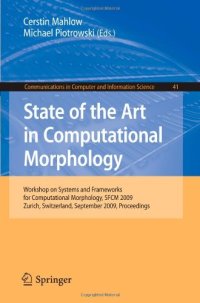
Ebook: State of the Art in Computational Morphology: Workshop on Systems and Frameworks for Computational Morphology, SFCM 2009, Zurich, Switzerland, September 4, 2009. Proceedings
- Genre: Computers // Cybernetics: Artificial Intelligence
- Tags: Language Translation and Linguistics, Document Preparation and Text Processing, Mathematical Logic and Formal Languages, Computer Appl. in Arts and Humanities, Data Mining and Knowledge Discovery, Pattern Recognition
- Series: Communications in Computer and Information Science 41
- Year: 2009
- Publisher: Springer-Verlag Berlin Heidelberg
- City: Berlin; New York
- Edition: 1
- Language: English
- pdf
From the point of view of computational linguistics, morphological resources are the basis for all higher-level applications. This is especially true for languages with a rich morphology, such as German or Finnish. A morphology component should thus be capable of analyzing single word forms as well as whole corpora. For many practical applications, not only morphological analysis, but also generation is required, i.e., the production of surfaces corresponding to speci?c categories. Apart from uses in computational linguistics, there are also numerous practical - plications that either require morphological analysis and generation or that can greatly bene?t from it, for example, in text processing, user interfaces, or information - trieval. These applications have speci?c requirements for morphological components, including requirements from software engineering, such as programming interfaces or robustness. In 1994, the First Morpholympics took place at the University of Erlangen- Nuremberg, a competition between several systems for the analysis and generation of German word forms. Eight systems participated in the First Morpholympics; the conference proceedings [1] thus give a very good overview of the state of the art in computational morphologyfor German as of 1994.
This book constitutes the refereed proceedings of the Workshop on Systems and Frameworks for Computational Morphology, SFCM 2009, held in Z?rich, Switzerland, in September 2009.
The workshop had three main goals: to stimulate discussion among reseachers and developers and to offer an up-to-date overview of available systems for German morphology which provide deep analyses and are suitable for generating specific word forms; to stimulate discussion among developers of general frameworks that can be used to implement morphological components for several languages; to discuss aspects of evaluation of morphology systems and possible future competitions or tasks, such as a new edition of the Morpholympics.